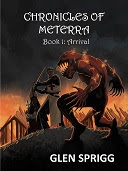That's a strong statement, I know. But it's true; the vast majority of epic fantasy published in my lifetime falls into two categories: Tolkien derivative, or (since the turn of the century) Rowling derivative. It's unfortunate, because fantasy comes in a lot of different flavors than epic trilogies. Some of the best fantasy ever written is contained in books that by today's standards aren't long enough for a prologue. Three Hearts and Three Lions by Poul Anderson, for example, is only 167 pages, and it's got more action, excitement, and fantasy than entire bookshelves of modern fantasy writing.
Tolkien was breaking new ground in fantasy fiction when he wrote The Hobbit and the Lord of the Rings. First, the heroes weren't humans; he had elves, dwarves, and hobbits running around taking up lots of screen time, and the elves and dwarves weren't anything like the ones from Norse mythology. Second, his heroes didn't work alone; they worked in large groups (fifteen or nine), working together to overcome obstacles and complications in their quests. Third, his story was spread over three books rather than being self-contained in a single volume as most fantasy writing was. The seminal Barsoom books of Edgar Rice Burroughs were all self-contained, where you could stop the story at the end of any book (although there are cliffhangers sometimes), and the next book would be another self-contained story. But Tolkien was writing something massive, and it took three whole books to get it all in.
The Hobbit was published in 1937, and the Lord of the Rings in the mid-1950s (one volume a year). And while it was widely recognized as an epic story and worthy of inclusion in any fantasy reading list, it was only one example of the genre. Other examples included Lovecraft, C.A. Smith, Burroughs, Merrit, Howard's Conan, Lieber's Lankhmar stories, Dunsany's whimsical tales, Fletcher Pratt, L. Sprague de Camp, and dozens of other writers with their own unique visions of what fantasy could be.
So, what happened? Well, in 1977 Terry Brooks released his own version of Lord of the Rings, The Sword of Shannara. In this story, a mysterious sorcerer (the druid Allanon) takes an unlikely commoner on an epic quest, with a motley group of companions including an elf and a dwarf. In Shannara, elves and dwarves were good friends, which was one of the few things that distinguished the Four Lands from Middle-Earth. The main hero gets separated from his companions and has to complete the quest on his own, while his companions fight an epic battle to buy him some time. It was an obvious and blatant pastiche (or, more unkindly, a total rip-off) of Lord of the Rings.
And it was a smash success, selling a whole lot of copies as people ate it up with a spoon. I admit, I was one of them; I read Shannara before I read LOTR (out of order, too; I read Elfstones first and had no clue about some of the characters), and I enjoyed it. It was one of the first fantasy novels I had read, outside of younger fare such as the Oz books, or Greek mythology.
So, with the near-instant success of Shannara, suddenly publishers saw epic fantasy as the gateway to big profits. After all, when someone is willing to buy three books to get the whole story, that's three times as much money in the bank account. Shannara and the really awful Thomas Covenant books were the gateway, and the flood began by the early 1980s. The other fantasy genres vanished almost overnight, except in reprint compilations and the like.
For my generation, LOTR and its copycats WERE fantasy literature. Dungeons & Dragons, we all thought, was based almost solely on LOTR, because that's all we knew. The legendary Appendix N? Never heard of it. Tolkien was the ur-text, and there was nothing else.
Thankfully, I found out later in life that yes, there are other fantasy books, and those are the ones that inspired the world's greatest game. Tolkien's trappings (non-human protagonists, hobbits/halflings, orcs, epic underground complexes, etc.) were cool, but they were only a part of the game. Gandalf certainly didn't read like a D&D magic-user; he hardly ever cast any spells, he used a sword, he spent a good chunk of the books dead (but got better)...it just didn't mesh well. But we didn't notice, because we didn't know about the alternatives.
As time went on, the trilogies became much longer. The Wheel of Time was the most ridiculous, spanning fourteen volumes by the time it was finished by another author, since the first one didn't live long enough to complete it. It started off well, but by the fifth or sixth volume it was a slog. I finished it through sheer tenacity, but it's not something I'm ever going to read again. Game of Thrones was unreadable, and apparently it will never be finished. I can't say I'm disappointed. Or surprised.
Now, though, independent writers have rediscovered the joys of self-contained stories. Shorter volumes at an affordable price that can be just as entertaining as the multi-volume epics. I happen to have some of this very kind of book available at Amazon right now. Check it out, and see how 'short' doesn't mean the story is lacking.

No comments:
Post a Comment